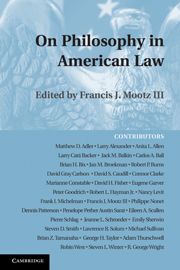Book contents
- Frontmatter
- Contents
- Introduction
- PART I KARL LLEWELLYN AND THE COURSE OF PHILOSOPHY IN AMERICAN LAW
- 1 On Philosophy in American Law (1934)
- 2 Law in Life, Life in Law: Llewellyn's Legal Realism Revisited
- 3 On Realism's Own “Hangover” of Natural Law Philosophy: Llewellyn Avec Dooyeweerd
- 4 On the Instrumental View of Law in American Legal Culture
- 5 When Things Went Terribly, Terribly Wrong
- 6 The Mechanics of Perfection: Philosophy, Theology, and the Foundations of American Law
- PART II PHILOSOPHICAL PERSPECTIVES ON LAW
- PART III AREAS OF PHILOSOPHY AND THEIR RELATIONSHIP TO LAW
- PART IV PHILOSOPHICAL EXAMINATIONS OF LEGAL ISSUES
- PART V LAW, RHETORIC, AND PRACTICE THEORY
- PART VI QUESTIONING THE RELATIONSHIP BETWEEN PHILOSOPHY AND AMERICAN LAW
- PART VII COMMENTARIES
- Contributors and Selected Bibliography
- Name Index
1 - On Philosophy in American Law (1934)
Published online by Cambridge University Press: 31 July 2009
- Frontmatter
- Contents
- Introduction
- PART I KARL LLEWELLYN AND THE COURSE OF PHILOSOPHY IN AMERICAN LAW
- 1 On Philosophy in American Law (1934)
- 2 Law in Life, Life in Law: Llewellyn's Legal Realism Revisited
- 3 On Realism's Own “Hangover” of Natural Law Philosophy: Llewellyn Avec Dooyeweerd
- 4 On the Instrumental View of Law in American Legal Culture
- 5 When Things Went Terribly, Terribly Wrong
- 6 The Mechanics of Perfection: Philosophy, Theology, and the Foundations of American Law
- PART II PHILOSOPHICAL PERSPECTIVES ON LAW
- PART III AREAS OF PHILOSOPHY AND THEIR RELATIONSHIP TO LAW
- PART IV PHILOSOPHICAL EXAMINATIONS OF LEGAL ISSUES
- PART V LAW, RHETORIC, AND PRACTICE THEORY
- PART VI QUESTIONING THE RELATIONSHIP BETWEEN PHILOSOPHY AND AMERICAN LAW
- PART VII COMMENTARIES
- Contributors and Selected Bibliography
- Name Index
Summary
“The inquiry as to a theory” remarks Pareto, “runs in terms of what it did for the man who made it—and of what it did for the men who accepted it.” There is rarely a lack of the theories in the world, or even in the air—or of philosophies. Nor, for that matter, when the philosophies die do the books die with them which contain them. But life-in-action a theory can gain only when it serves men's needs. Life-in-action; I am less concerned here with currency-in-words. Men may scorn philosophies, as philosophers are fond of making clear, without escaping the necessity of living in terms of some one of them—or of some inconsistent hodge-podge of a dozen. Thus what is here before the telescope is the changing array not of verbalized philosophies, but of philosophies-in-action as the history of law in these United States has gone its way. What those philosophies were, what needs they served—and whose. I am not so much concerned, I repeat, with the philosophers themselves, with whom indeed my acquaintance is but scanty. I am concerned with philosophy-in-action, with implicit philosophy, with those premises, albeit inarticulate and in fact unthought, which yet make coherence out of a multiplicity of single ways of doing. Where explicit writers happen to be mentioned, it is as persons giving fortunate expression to the living currents of their time. With an exception.
- Type
- Chapter
- Information
- On Philosophy in American Law , pp. 3 - 10Publisher: Cambridge University PressPrint publication year: 2009



